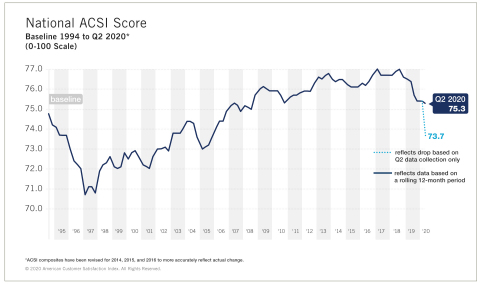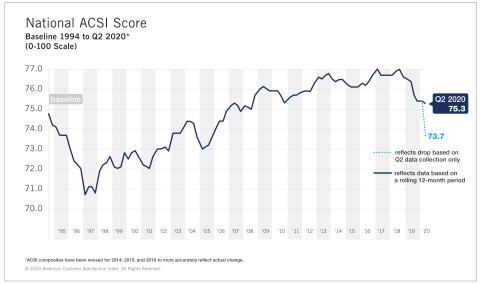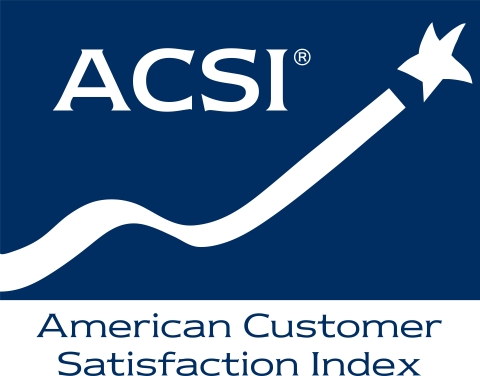ANN ARBOR, Mich.--(BUSINESS WIRE)--Although the American Customer Satisfaction Index (ACSI®) remains essentially unchanged as a rolling 12-month index, the picture changes dramatically for data collected during the second quarter of 2020.
As the COVID-19 pandemic spread across the country, U.S. customer satisfaction plunged 1.7% to a score of 73.7 (out of 100) in a year-over-year comparison – its steepest decline ever.
Since the aggregate national ACSI score reflects customer satisfaction across industries over a rolling 12-month period--well before the pandemic--that data is very different and not reflective of customer satisfaction today. As indicated by the dotted line in the graph, the Q2 downturn is both broad and deep, with retail (down 2.7%) and government services (down 5.4%) hit especially hard.
The implications for the economy are devastating. Consumer spending makes up about two-thirds of gross domestic product (GDP). It fell at an annualized rate of 34.6% in the second quarter, with GDP plummeting 32.9% (also annualized), leading to record unemployment and many company bankruptcies.
It is increasingly unlikely that there will be a V-shaped economic recovery because there is a strong relationship between the spread of the virus and economic contraction. Until the pandemic is subdued, the economy will not recover. Instead of a V-shaped recovery, it is more likely that it will be like a string of “Ws,” with fits and starts, much of it due to pent-up demand and consumers’ ability and willingness to spend. Customer satisfaction plays a role in the latter.
“The elemental factors that drive customer satisfaction have changed,” said Claes Fornell, Chairman and Founder of ACSI. “To a significant number of people, it is no longer just about a great shopping and consumption experience, but rather avoiding the risk of death, or at least minimizing the risk. Economic recovery is highly dependent on companies that can do that, and they are also the companies that will do well.”
With high unemployment, the ability of consumers to spend is also uncertain, but will be helped by the fact that households are saving money at a record level. Nevertheless, they are unlikely to dip into these savings unless they have to or when it is safe to do so.
Digitalization of buyer-seller transactions has been a key to greater customer satisfaction for some time now. It is also true, however, that customer satisfaction began to weaken well before the emergence of the virus, as many companies struggled with adapting to a new consumer economy and relied on dubious data analytics for improving customer relationships.
The trend toward more transactions without physical contact will accelerate. Many consumers will continue to favor websites and mobile apps. Even traditional retailers, restaurants, sport and entertainment arenas, etc., where transactions typically involve physical contact between buyer and seller or between large groups of buyers, need to find ways to do more social distancing and virtual interactions with their customers.
The companies at the forefront of the digital and online markets -- those that quickly adjusted -- show the way: Amazon tops e-retailers (83) and is a perennial customer satisfaction leader across all industries; Domino’s (79) leads pizza delivery chains; Google (79) is the top search engine; and Publix (83) is one of the satisfaction leaders among supermarkets. These companies have not only improved their customer satisfaction during the pandemic, but are also registering strong sales and earnings as a result.
The national ACSI score (or ACSI composite) reflects customer satisfaction across all sectors and industries over a rolling 12-month period. For more, follow the American Customer Satisfaction Index on LinkedIn and Twitter at @theACSI or visit www.theacsi.org.
No advertising or other promotional use can be made of the data and information in this release without the express prior written consent of ACSI LLC.
About the American Customer Satisfaction Index
The American Customer Satisfaction Index has been a national economic indicator for 25 years. It measures and analyzes customer satisfaction with more than 400 companies in 46 industries and 10 economic sectors, including various services of federal and local government agencies. Reported on a scale of 0 to 100, scores are based on data from interviews with roughly 500,000 customers annually. For more information, visit www.theacsi.org.
ACSI and its logo are Registered Marks of the University of Michigan, licensed worldwide exclusively to American Customer Satisfaction Index LLC with the right to sublicense.




